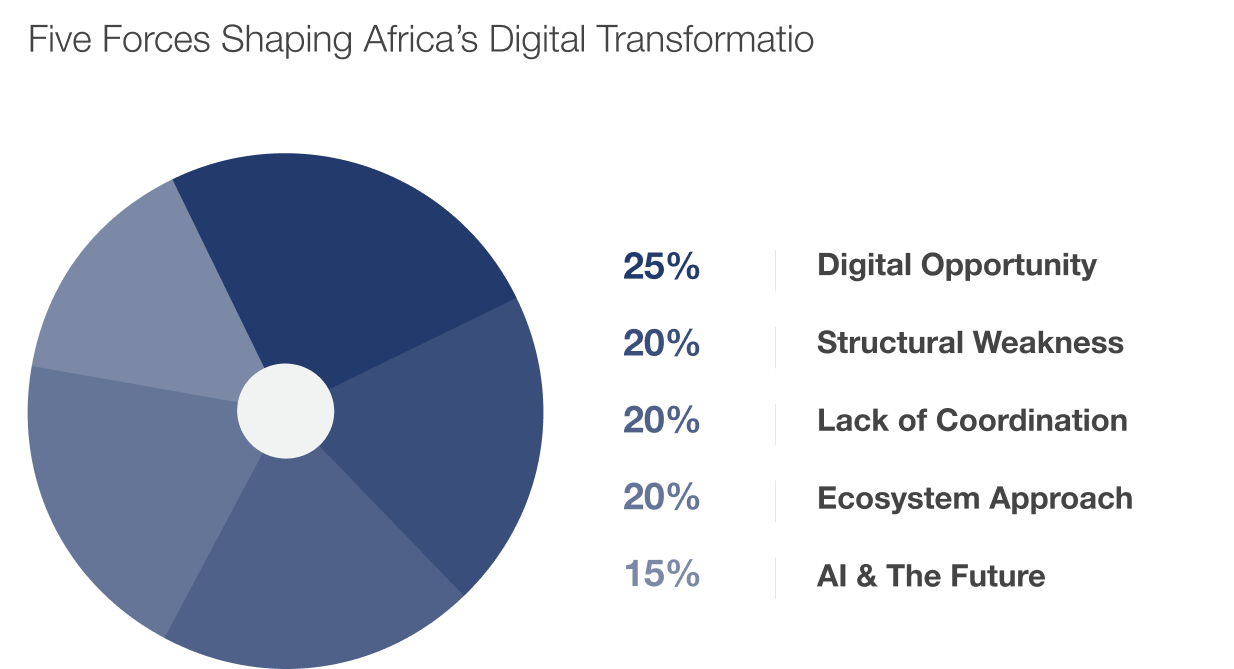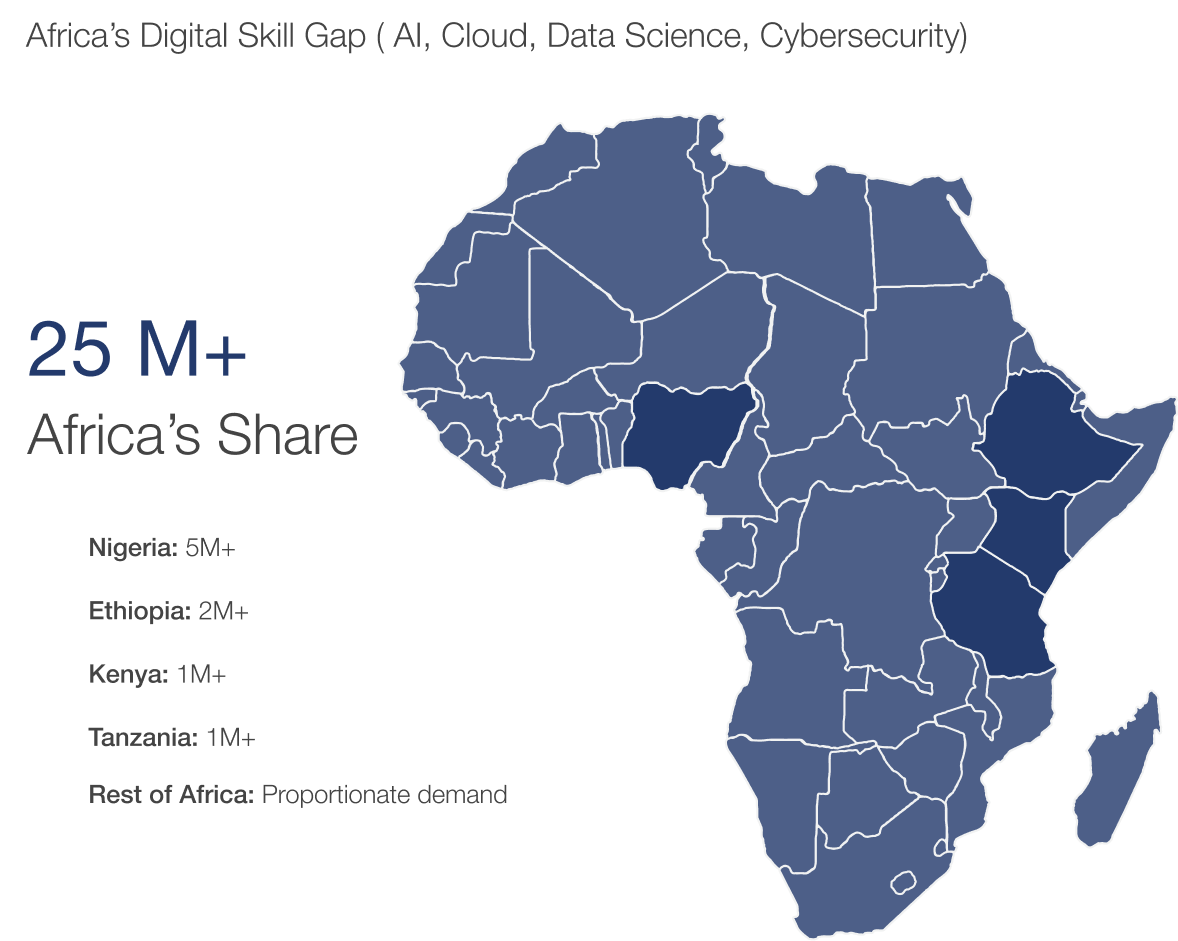
Digital Economies Challenges and Opportunities in Africa
Africa must unite around a strategic, AI-driven digital ecosystem to unlock its growth potential and secure its future in the global economy.
.2e81242a.png&w=256&q=75)
Download the report: Digital Economies Challenges and Opportunities in Africa
Executive Summary
Africa is at a defining moment in its digital transformation. With a projected population of 2.5 billion by 2050, the continent has an opportunity to harness digital technologies for economic growth, job creation, and global competitiveness. However, fragmented policies, weak infrastructure, a shortage of digital skills, and cybersecurity risks pose significant challenges. Without a structured and coordinated approach integrating policy, infrastructure, education, and investment, Africa’s Digital Economy risks being built on an unstable foundation.
A major obstacle is the lack of a unified strategy for digital economic development. Many African governments work in isolation, leading to inefficient policies and resource allocation. Without a structured plan for workforce development and infrastructure investment, the continent struggles to sustain digital growth.
To compete globally, Africa must move beyond isolated efforts and adopt a holistic, ecosystem-driven approach. Strengthening infrastructure, reforming regulatory frameworks, fostering public-private partnerships (PPPs), and aggressively investing in digital skills will be essential. Most importantly, Africa must recognize the transformative potential of Artificial Intelligence (AI) as a suite of technologies that will shape the Fourth Industrial Revolution throughout the continent.

Insight
1. Power Infrastructure Deficit
A strong digital economy relies on a stable, affordable, and scalable power supply. However, unreliable electricity remains one of Africa’s greatest obstacles to sustained digital growth. Without energy security, Africa’s digital transformation will remain stalled.
Only South Africa produces electricity on a scale close to the developed-world standard, so frequent power outages, high electricity costs, and limited grid access hinder the expansion of data centers, broadband networks, fintech platforms, and AI-driven innovations throughout most of the continent.
More than 600 million Africans lack access to electricity, and IDCA research shows that more than 30 African nations provide less than 10 percent of the per-person electricity found in the developed world. Businesses and service providers thus must often rely on expensive, unsustainable backup solutions such as diesel generators, increasing operational costs and harming the environment. Without a stable power supply, Africa cannot support AI-driven industries, cloud computing, or large-scale e-commerce.

Within this context, it seems clear that governments must prioritize renewable energy investments as they scale up to accommodate new digital infrastructure. There are rays of light in this picture, with 13 African nations already delivering 70 percent or more of their electricity through renewable means. Another 10 nations have renewable grids that deliver above the world average of 30 percent of their overall electricity. Integrating smart grids and energy storage technologies can provide additional help to stabilize power supplies, ensuring that digital services remain operational even during grid failures.
Yet Africa’s existing data center and digital infrastructure footprint remains underdeveloped, consuming a fraction of a percent of its electricity grids. South Africa’s Johannesburg does have a footprint running to several hundred megawatts, placing it within the Top 10 hubs in the EMEA region. Lagos, Nigeria and Nairobi, Kenya have been identified as emerging markets, with data centers collectively stretching into the low dozens of megawatts.
2. Digital Skills Gap & Workforce Development Deficit
A thriving digital economy requires a workforce equipped with essential digital skills, yet many African countries lack a coordinated approach to digital education. Outdated education systems fail to prepare students for technology-driven careers, widening the gap between industry needs and workforce capabilities. AI, cybersecurity, data science, and cloud computing are in high demand, yet Africa lags in producing talent in these fields.

IDCA research has identified the need for more than 100 million new IT jobs to be created worldwide within the next several years to meet the needs of the rapidly expanding, AI-driven data center and digital infrastructure footprints.
More than 25 million of those jobs would be needed to be created throughout Africa for the continent to start to reach its economic potential. Almost 5 million of those jobs would be needed to be created in Nigeria for Africa’s most populated nation (with almost 230 million people) prosper. More than 2 million new jobs would be needed in Ethiopia, more than 1 million in each of Kenya, Tanzania, and Ethiopia, and proportionate numbers would be required throughout the rest of African nations.
To address their challenges, African governments must integrate digital skills training into national curricula, establish AI research hubs, and foster university-industry partnerships. Additionally, policies must focus on retaining top talent by offering competitive incentives and career growth opportunities. If Africa fails to develop and retain a skilled digital workforce, it risks becoming a mere consumer rather than a creator of technology.

3. High Connectivity Costs & Limited Telecom Liberalization
Many African countries maintain restrictive telecommunications policies, with state-owned providers dominating the sector. This monopolization limits competition, drives up internet costs, and slows broadband expansion - hindering digital inclusivity. The cost of internet access remains prohibitively high for many citizens, making digital services inaccessible.
To foster innovation and expand connectivity, African governments must embrace telecom liberalization. Allowing multiple service providers, reducing bureaucratic barriers, and encouraging infrastructure-sharing agreements can drive down costs and expand broadband access. Investing in last-mile broadband expansion is also critical to ensuring that rural and underserved areas are not left behind.
Lowering internet costs will drive digital adoption, enhance e-commerce growth, and create remote job opportunities, ensuring broader economic inclusion.
4. Fragmented Digital Infrastructure & Regulatory Frameworks
A major challenge in Africa’s digital economy is the lack of standardized policies governing broadband deployment, data centers, and cloud adoption. The absence of regulatory consistency leads to inefficiencies, security vulnerabilities, and barriers to scaling digital businesses.
Governments must establish clear, enforceable national standards for digital infrastructure to ensure security, efficiency, and long-term sustainability. A harmonized regulatory framework aligned with the African Continental Free Trade Area (AfCFTA), for example, will facilitate cross-border digital trade, attract investment, and foster regional innovation hubs. Without regulatory coherence, Africa’s digital economy will remain fragmented and unable to achieve its full potential.

5. Limited Access to Capital
Despite Africa’s growing Digital Economy, access to funding remains a critical barrier. While venture capital investment in African tech startups has increased, the funding landscape is highly concentrated in a few major hubs such as Nigeria, Kenya, South Africa, and Egypt. Many startups and digital infrastructure projects in emerging markets struggle to secure financing due to high-risk perceptions and regulatory uncertainty.
To unlock sustainable funding, governments must encourage a public-private investment model. Structured investment mechanisms such as sovereign digital economy funds, co-financed by both public and private stakeholders, can provide long-term financing for broadband expansion, AI research hubs, and fintech growth. Blended finance models – combining venture capital, impact investment, and government-backed grants – can also de-risk investments in underserved regions.

6. Cybersecurity Risks & Digital Trust Deficit
As Africa’s digital economy expands, so do cybersecurity threats. Cybercriminals are increasingly targeting mobile banking, fintech platforms, cloud computing, and e-commerce services, leading to financial fraud, identity theft, and data breaches. Many African countries lack comprehensive cybersecurity policies and enforcement mechanisms, leaving digital platforms vulnerable.
One of the biggest consequences of weak cybersecurity frameworks is the erosion of digital trust. Consumers and businesses are hesitant to adopt digital services if they do not feel their data is secure. This trust deficit not only slows fintech and e-commerce adoption but also discourages foreign investors and technology firms from expanding into African markets.
Governments must adopt proactive cybersecurity measures by enforcing strong national cybersecurity laws, investing in cybersecurity talent development, and enhancing cross-border intelligence sharing. Strengthening digital identity frameworks and raising public awareness of cyber risks will also be crucial in building a secure digital ecosystem.
Opportunities for Africa’s Digital Transformation
1. Strengthening Digital Policy & Market Integration
A cohesive digital policy framework will:
- Enable seamless cross-border digital trade.
- Ensure interoperability of payment systems and digital platforms.
- Foster a standardized approach to e-governance.
By working together under initiatives such as AfCFTA, African nations can create a more integrated and competitive digital economy.
2. Fintech & Financial Inclusion
Africa is a global leader in fintech innovation, with mobile money platforms and blockchain-powered financial solutions driving financial inclusion. There are more than 150 platforms and services throughout the continent today, including Kenya’s pioneering M-PESA, Airtel Money, CinetPay, Ecocash, Julia, Orange Money, Payday, Maxicash, MTN Mobile Money, Paga, TerraPay, Waya, and Xend. Contiuing to develop services will create economic opportunities for millions of unbanked and underbanked individuals.

3. Artificial Intelligence & Cloud Computing
AI is already transforming agriculture, healthcare, education, and financial services across Africa. AI-driven predictive analytics can optimize farming yields, machine learning algorithms can improve healthcare diagnostics, and natural language processing can break linguistic barriers in online education.
To maximize AI’s potential, African governments must establish AI research hubs, fund AI startups, and integrate AI into national economic policies. Investments in cloud computing and data centers will further support AI-driven solutions tailored to local markets.
4. Digital Trade & E-commerce Growth
Africa’s e-commerce sector remains largely untapped due to poor logistics and an unfortunate lack of reliable digital payment systems to complement the continent’s burgeoning mobile-money platforms. By increasing the size of its digital infrastructure fooprint and strengthening online payment security, African nations can unlock more of their digital marketplace potential.
A Call to Action
Africa’s digital economy is at a critical inflection point at the moment. The continent could become a global tech powerhouse, but success depends on overcoming fragmented strategies, infrastructure challenges, and policy gaps. Implementing a cohesive, forward-thinking approach – one that prioritizes digital skills, regulatory harmonization, and infrastructure expansion – will drive economic growth, innovation, and job creation.
Overcoming power shortages, skill deficits, and cybersecurity risks requires bold leadership and strategic investment. AI represents Africa’s greatest opportunity to leapfrog development barriers and establish itself as a global tech leader. Through collaboration, visionary leadership, and determination, Africa’s governmental and business leaders can harness digital transformation to secure long-term prosperity.

Conclusion
Africa stands on the threshold of a digital renaissance. With its young, fast-growing population and increasing entrepreneurial spirit, the continent holds immense potential to become a leader in the global digital economy. Yet, realizing this vision requires more than isolated progress — it demands a unified, intentional strategy centered around infrastructure development, regulatory harmonization, workforce readiness, and technological innovation. IDCA’s global research underscores that sustainable digital economies are built on three foundational pillars: 1. Robust, scalable digital infrastructure that supports everything from connectivity to AI and data center ecosystems. 2. Widespread digital education and workforce development to empower citizens with the skills needed for today’s and tomorrow’s digital industries. 3. Strategic integration of Artificial Intelligence as a driver for national innovation, service delivery, and economic inclusion. Africa’s digital future hinges on its ability to connect these pillars within a coherent national and continental framework. When digital services are backed by reliable infrastructure and governed by strong, future-proof policies, they create a powerful engine for economic growth, regional integration, and social equity. Incremental but deliberate progress will be key. Governments, industry leaders, and development partners must commit to a shared vision, investing steadily and collaboratively. The digital economy is not a destination but a dynamic journey — and with sustained focus, Africa can leap from a fragmented present to a globally competitive digital future.
Trending Insights
IDCA News